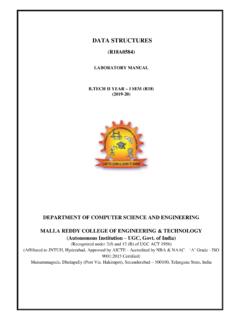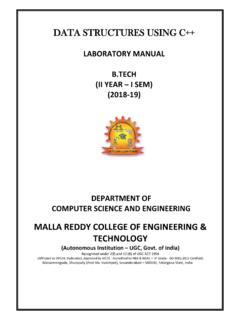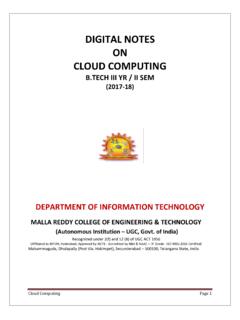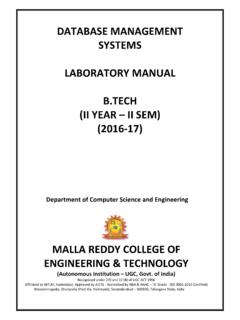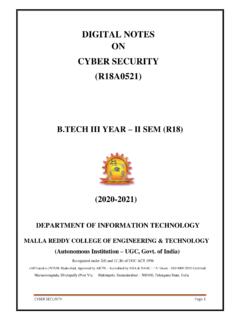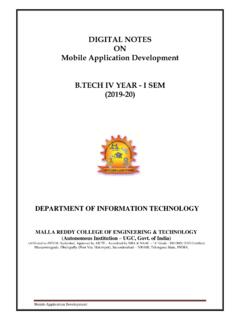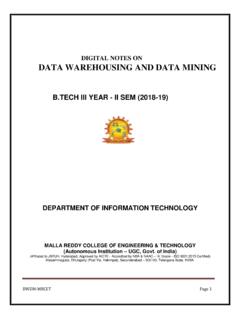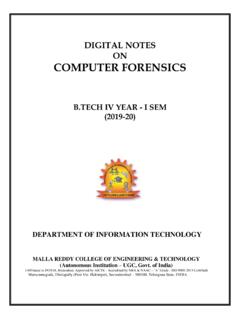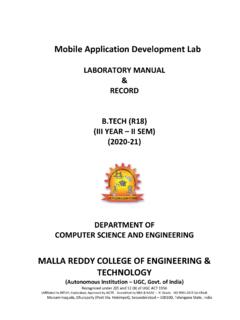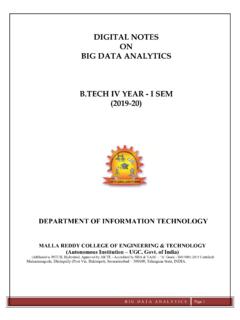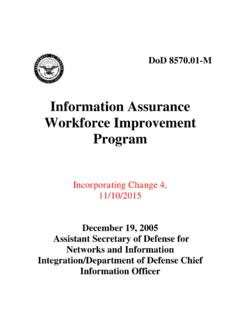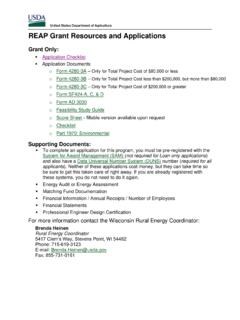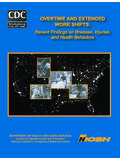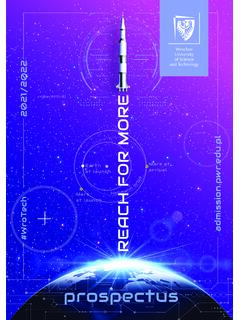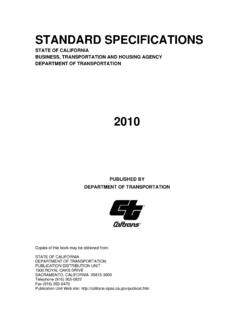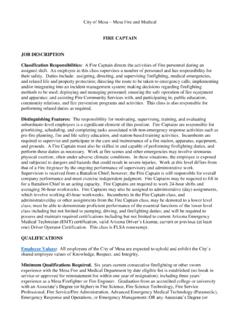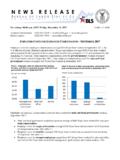Transcription of OPERATING SYSTEMS LABORATORY MANUAL B.TECH (R18) …
1 OPERATING SYSTEMS LABORATORY MANUAL (R18) (II YEAR I SEM) (2019 2020) DEPARTMENT OF COMPUTER SCIENCE AND ENGINEERING MALLA REDDY COLLEGE OF ENGINEERING & TECHNOLOGY (Autonomous Institution UGC, Govt. of India) Recognized under 2(f) and 12 (B) of UGC ACT 1956 Affiliated to JNTUH, Hyderabad, Approved by AICTE Accredited by NBA & NAAC A Grade ISO 9001:2015 Certified) Maisammaguda, Dhulapally (Post Via. Hakimpet), Secunderabad 500100, Telangana State, India DEPARTMENT OF COMPUTER SCIENCE AND ENGINEERING VISION To improve the quality of technical education that provides efficient software engineers with an attitude to adapt challenging IT needs of local, national and international arena, through teaching and interaction with alumni and industry. MISSION Department intends to meet the contemporary challenges in the field of IT and is playing a vital role in shaping the education of the 21st century by providing unique educational and research opportunities.
2 PROGRAMME EDUCATIONAL OBJECTIVES (PEOs) PEO1 ANALYTICAL SKILLS To facilitate the graduates with the ability to visualize, gather information, articulate, analyze, solve complex problems, and make decisions. These are essential to address the challenges of complex and computation intensive problems increasing their productivity. PEO2 TECHNICAL SKILLS To facilitate the graduates with the technical skills that prepare them for immediate employment and pursue certification providing a deeper understanding of the technology in advanced areas of computer science and related fields, thus encouraging to pursue higher education and research based on their interest. PEO3 SOFT SKILLS To facilitate the graduates with the soft skills that include fulfilling the mission, setting goals, showing self-confidence by communicating effectively, having a positive attitude, get involved in team- work, being a leader, managing their career and their life.
3 PEO4 PROFESSIONAL ETHICS To facilitate the graduates with the knowledge of professional and ethical responsibilities by paying attention to grooming, being conservative with style, following dress codes, safety codes, and adapting themselves to technological advancements. PROGRAM SPECIFIC OUTCOMES (PSOs) After the completion of the course, B. Tech Information Technology, the graduates will have the following Program Specific Outcomes: 1. Fundamentals and critical knowledge of the Computer System:- Able to Understand the working principles of the computer System and its components , Apply the knowledge to build, asses, and analyze the software and hardware aspects of it . 2. The comprehensive and Applicative knowledge of Software Development: Comprehensive skills of Programming Languages, Software process models, methodologies, and able to plan, develop, test, analyze, and manage the software and hardware intensive SYSTEMS in heterogeneous platforms individually or working in teams.
4 3. Applications of Computing Domain & Research: Able to use the professional, managerial, interdisciplinary skill set, and domain specific tools in development processes, identify the research gaps, and provide innovative solutions to them. PROGRAMOUTCOMES (POs) Engineering Graduates should possess the following: 1. Engineering knowledge: Apply the knowledge of mathematics, science, engineering fundamentals, and an engineering specialization to the solution of complex engineering problems. 2. Problem analysis: Identify, formulate, review research literature, and analyze complex engineering problems reaching substantiated conclusions using first principles of mathematics, natural sciences, and engineering sciences. 3. Design / development of solutions: Design solutions for complex engineering problems and design system components or processes that meet the specified needs with appropriate consideration for the public health and safety, and the cultural, societal, and environmental considerations.
5 4. Conduct investigations of complex problems: Use research-based knowledge and research methods including design of experiments, analysis and interpretation of data, and synthesis of the information to provide valid conclusions. 5. Modern tool usage: Create, select, and apply appropriate techniques, resources, and modern engineering and IT tools including prediction and modeling to complex engineering activities with an understanding of the limitations. 6. The engineer and society: Apply reasoning informed by the contextual knowledge to assess societal, health, safety, legal and cultural issues and the consequent responsibilities relevant to the professional engineering practice. 7. Environment and sustainability: Understand the impact of the professional engineering solutions in societal and environmental contexts, and demonstrate the knowledge of, and need for sustainable development.
6 8. Ethics: Apply ethical principles and commit to professional ethics and responsibilities and norms of the engineering practice. 9. Individual and team work: Function effectively as an individual, and as a member or leader in diverse teams, and in multidisciplinary settings. 10. Communication: Communicate effectively on complex engineering activities with the engineering community and with society at large, such as, being able to comprehend and write effective reports and design documentation, make effective presentations, and give and receive clear instructions. 11. Project management and finance: Demonstrate knowledge and understanding of the engineering and management principles and apply these to one s own work, as a member and leader in a team, to manage projects and in multi-disciplinary environments. 12. Life- long learning: Recognize the need for, and have the preparation and ability to engage in independent and life-long learning in the broadest context of technological change.
7 II Year B. Tech CSE I Sem L T/P/D C - -/3/- (R18A0583) OPERATING SYSTEMS LAB OBJECTIVES: To understand the functionalities of various layers of OSI model To explain the difference between hardware, software; OPERATING SYSTEMS , programs and files. Identify the purpose of different software applications. Week 1: Simulate the following CPU scheduling algorithms. a) FCFS b) SJF c) Round Robin d) Priority. Week 2: Write a C program to simulate producer-consumer problem using Semaphores Week 3: Write a C program to simulate the concept of Dining-philosophers problem. Week 4: Simulate MVT and MFT. Week 5: Write a C program to simulate the following contiguous memory allocation Techniques a) Worst fit b) Best fit c) First fit.
8 Week 6: Simulate all page replacement algorithms a)FIFO b) LRU c) OPTIMAL Week 7: Simulate all File Organization Techniques a) Single level directory b) Two level directory Week 8: Simulate all file allocation strategies a) Sequential b) Indexed c) Linked. Week 9: Simulate Bankers Algorithm for Dead Lock Avoidance. Week 10: Simulate Bankers Algorithm for Dead Lock Prevention. Week 11: Write a C program to simulate disk scheduling algorithms. a) FCFS b) SCAN c) C-SCAN REFERENCE BOOKS: 1. An Introduction to OPERATING SYSTEMS , Bhatt, 2nd edition, PHI. 2. Modern OPERATING SYSTEMS , Andrew S Tanenbaum, 3rd Edition, PHI OUTCOMES: At the end of the course the students are able to: Ability to implement inter process communication between two processes. Ability to design and solve synchronization problems. Ability to simulate and implement OPERATING system concepts such as scheduling, Deadlock management, file management, and memory management.
9 MALLA REDDY COLLEGE OF ENGINEERING & TECHNOLOGY ( UGC-Autonomous Institution , Govt. of India ) (Permanently Affiliated to JNTUH, Approved by AICTE-Accredited by NBA & NAAC- A-Grade; ISO 9001:2008 Certified) Maisammaguda, Dhulapally Post, Via Hakimpet, Secunderabad 500100 DEPARTMENT OF COMPUTER SCIENCE AND ENGINEERING OPERATING SYSTEMS Lab MANUAL (R18A0583) TABLE OF CONTENTS NAMEOF THE EXPERIMENT 1 CPU SCHEDULING ALGORITHMS A) FIRST COME FIRST SERVE(FCFS) 1-3 B) SHORTEST JOB FIRST(SJF) 4-6 C) ROUND ROBIN 7-9 D) PRIORITY 10-12 2 PRODUCER-CONSUMER PROBLEM USING SEMAPHORES 13-14 3 DINING-PHILOSOPHERS PROBLEM 15-18 4 MEMORYMANAGEMENT TECHNIQUES A) MULTI PROGRAMMING WITH FIXED NUMBER OF TASKS(MFT) 19-21 B) MULTI PROGRAMMING WITH VARIABLE NUMBER OF TASKS(MVT) 22-24 5 CONTIGUOUS MEMORY ALLOCATION A) WORST FIT 25-26 B) BEST FIT 27-28 C) FIRST FIT 28-29 6 PAGE REPLACEMENT ALGORITHMS A) FIRST IN FIRST OUT(FIFO) 30-32 B) LEAST RECENTLY USED(LRU) 33-35 C) OPTIMAL 36-39 7 FILE ORGANIZATION TECHNIQUES A) SINGLE LEVEL DIRECTORY 40-42 B) TWO LEVEL DIRECTORY 43-46 8 FILE ALLOCATION STRATEGIES A)
10 SEQUENTIAL 47-49 B) INDEXED 50-52 C) LINKED 53-55 9 DEAD LOCK AVOIDANCE 56-59 10 DEAD LOCK PREVENTION 60-62 11 DISK SCHEDULING ALGORITHMS A) FCFS 63-64 B) SCAN 65-66 C) C-SCAN 67-69 MALLA REDDY COLLEGE OF ENGINEERING & TECHNOLOGY Maisammaguda, Dhulapally Post, Via Hakimpet, Secunderabad 500100 DEPARTMENT OF COMPUTER SCIENCE AND ENGINEERING GENERAL LABORATORY INSTRUCTIONS 1. Students are advised to come to the LABORATORY at least 5 minutes before (to starting time), those who come after 5 minutes will not be allowed into the lab. 2. Plan your task properly much before to the commencement, come prepared to the lab with the synopsis / program / experiment details. 3. Student should enter into the LABORATORY with: a. LABORATORY observation notes with all the details (Problem statement, Aim, Algorithm, Procedure, Program, Expected Output, etc.,) filled in for the lab session. b. LABORATORY Record updated up to the last session experiments and other utensils (if any) needed in the lab.
